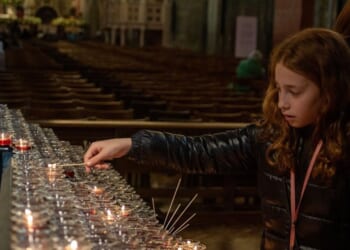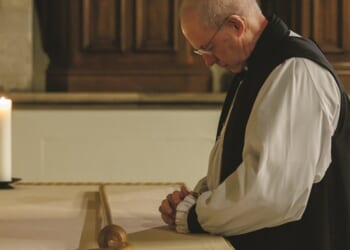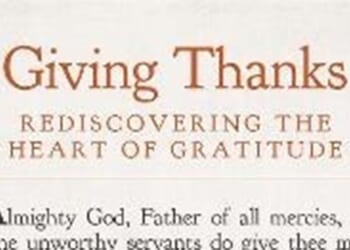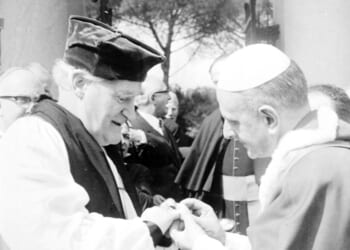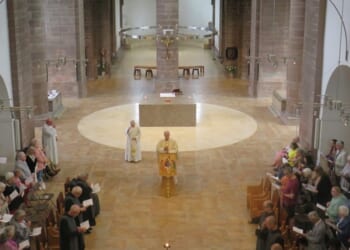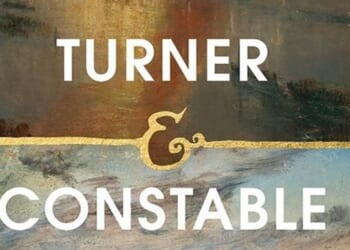FUNERALS come barging into everyday life like some out-of-control juggernaut, ripping apart the structure of our days, making heavy demands on us — some of which are impossible to meet, and adding another burden to an already over-burdened soul.
I am, of course, referring to the bereaved, for whom death — even if it is expected — is somehow always shocking, leaving everyone involved raw and vulnerable.
And, in the midst of all this, there is the expectation of arranging a church service: of summing up, somehow, all that a person meant; of sharing with others, through the inadequate medium of words and music, what might be decades of close companionship, love, and laughter. At the end of it, after the solemnity of the service, the finality of the disposal of human remains, and the hospitality of tea and cake, or beer and sandwiches, all that is left may be silence and tears.
AND yet funerals are among the most powerful and precious gifts that a church can make to those who mourn. Church funerals provide space — physical space, in which all those who loved can gather and celebrate a life well lived; and mental space, in which to express the mixture of thankfulness and deep, deep sadness. They offer a bridge towards a different way of life, crossed reluctantly but inevitably. This journey is helped by a liturgy of transition, smoothed by the age-old language of loss, familiar from previous events, perhaps, but searingly new in the context of the particular.
These services, unique on every occasion, offer gratitude for joys past, deep sympathy for current misery, and hope for all in the life, death, and resurrection of Christ, who shattered once and for all our chains of mortality. So, those of us who minister at funerals may not undertake these pieces of work lightly, however often they occur in our parishes, however disruptive they might be to our timetables, however draining on our physical and emotional resources. They are one of the most profound things that we can offer to an individual and a community, and it is a privilege to be able to do that.
THIS is not the place to discuss the mechanics of taking a funeral — a good curacy will do that, and, if it doesn’t, a couple of years in parish ministry certainly will. There are, though, three precepts I would like to offer:
1. It’s not about you
YOU may have emerged from your ordination prayed up and enthusiastic, with many excellent notions on how a “good” funeral should look. After years at the coalface of ministry, you may have developed a set of principles — principles that have stood you in good stead, and from which you do not wish to deviate. In either case, remember that it is not your funeral. Choose the hymns, readings, and music for your own by all means — one of the most charitable things you can do for those you leave behind is to write down what you want at your funeral. But, however much you dislike country and western, it is not up to you to veto.
The only time when this rule doesn’t apply is in the case of actual blasphemy. Your idea of what constitutes “good taste” and “appropriate” should not be imposed on those for whom the service is designed. All sorts of things that we would not personally find helpful might be incredibly important for those who mourn. Provided we stick within the very generous confines of what is permitted within our denominations, allow the family to express their grief in their way, not yours.
2. It’s not about you
IT IS a bold thing to say, but funerals can be an incredible ego-booster. People in deep shock at the death of someone they loved might well cling to you as one who has accompanied others along the lonely and horrible road that they are currently treading; and may look to you, as one who is wiser and more experienced, for advice. Those who mourn may be extremely reassured by your presence and grateful that you speak freely about a subject that is one of the last remaining taboos in society, and therefore an unknown entity. They may ask your opinion, not only about the funeral service, but other aspects as well. At the end of the funeral service, mourners will shake your hand earnestly and thank you for all that you have done.
It would be easy to get an inflated idea of your own importance. As an antidote to this, try telling those arranging a funeral that they can have the date that they wanted or you as the minister, but they can’t have both. Mostly, people pick the date.
3. It’s not about you
SYMPATHY is vital. Empathy can be destructive. Nobody wants a minister who is so bound up in the distress of the bereaved that they are weeping themselves. Do not fill up the space with your own grief to the point that there is no room for theirs, however triggering you may have found a particular death. There is plenty of time for that after the service, when you are on your own again.
On the other hand, it is important to be aware of, and sensitive to, the huge variety of emotions that are present at any funeral, and to be able both to respond to them with care and manage them with skill.
4. It is about you
FUNERALS are exhausting. They should be, as we encounter the event that we most fear, both for ourselves and others. As ministers, we lead the way, engaging with the oldest rite of passage in a way that brings comfort and solace, gratitude and hope. We choreograph the journey that leads through despair at loss to faith in the promise of a future in Christ. Small wonder that we need to factor in “decompression time” afterwards.
The Revd Dr Sally Welch is Vicar of the Kington Group in the diocese of Hereford.
PRACTICAL POINTS:
Coffin-bearers: Be aware of the local custom for this. In some areas, carrying the coffin is left to the professionals, which is the simplest and safest option. Other communities make it a matter of pride and a last gesture of love and friendship to carry the coffin of the one they loved.
Make friends with your local funeral directors: they are genuine superheroes. In my experience, the small family firms, in particular, will go to great lengths to fulfil people’s requests and wishes, however outlandish, all without judgement and with only the occasional touch of black humour.
On the other hand, never be too busy to check out the burial site. You will look daft if you lead the cortège in the wrong direction — and traumatise everyone if the grave has not been dug.
Collections: This is potentially a legal and financial minefield. The best and clearest information I have seen on this tricky subject is a leaflet by the diocese of Hereford, here.
FINAL NOTE: Never, ever, overrun your time-slot at the crematorium. It is extremely selfish, and will annoy all the people with whom you need good relationships for the future. If in doubt, book two.


